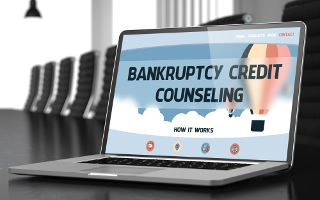What is the Pre-Bankruptcy Filing Credit Counseling?
In order to file bankruptcy, you have to meet certain requirements. The completion of pre-bankruptcy filing credit counseling courses is one of these prerequisites. Not only is the counseling mandatory for people who are looking into bankruptcy, it could also provide useful information and financial management skills for the future.
What is Credit Counseling?
According to the United States Bankruptcy Court District of Arizona, the completion of pre-bankruptcy filing credit counseling from a US Trustee-approved agency is a prerequisite for bankruptcy filing. Upon the completion of the course, you will get a credit counseling certificate. The certificate should be submitted alongside the other documents when filing.
Individuals who are on active military duty are exempt from the credit counseling requirement. The same applies to individuals who suffer from either a physical or a mental impairment.
The credit counseling sessions with an approved provider will need to cover a number of essential topics. The absolute minimum that has to be met is personal finance review, personal budget planning and a discussion about the implications of bankruptcy and the eventual alternatives.
 In essence, pre-filing counseling is needed to ensure that a person interested in a bankruptcy discharge is aware of the implications. These individuals are also given basic information about personal finances and ensuring economic stability in the future.
In essence, pre-filing counseling is needed to ensure that a person interested in a bankruptcy discharge is aware of the implications. These individuals are also given basic information about personal finances and ensuring economic stability in the future.
Counseling sessions typically last an hour. Depending on the options being provided, it can be done both in person and online. Some providers also make it possible for debtors to complete counseling via phone.
Every debtor is responsible for paying for the counseling session. The price will vary but a typical charge to expect is about 50 dollars. Keep in mind that all of the certified counseling agencies have to provide free of charge services to individuals who cannot afford the session.
Pre-Filing Counseling is Not the Same as Debtor Education
The counseling is one of the educational elements that debtors have to complete. There is also a second requirement that will need to be completed before the debt discharge (not necessarily before the bankruptcy filing). This second element is the debtor education program.
The course will once again have to be approved by the US Trustee. It will cover an array of important topics like budgeting, being responsible with credit and managing money for the purpose of avoiding debt in the future.
Such courses can once again be attended in person or they may be completed via an online platform. Depending on the depth of the course and the specifics of the providing agency, the cost of participation will be in the range from 50 to 100 dollars.
Just like in the case of pre-bankruptcy counseling, people who complete the debtor education course will be provided with a certificate.
Choosing the Right Counseling and Debtor Education Agency
You should definitely view the pre-bankruptcy counseling and the debtor education classes as more than an administrative requirement. You can learn a lot, which is why you should spend some time identifying the right agency and the right course.
The specifics of the program need to be examined first. What will you be learning? Will you acquire skills to manage your finances better in the future? On top of that, you should learn a bit more about the qualifications of the counselors and the instructors.
The fees and charges are obviously also important. Inquire about the pricing structure and about the possibility of getting fees waived.
Some other questions you may want to ask include inquiries about additional services (like budget counseling and debt management classes), the availability of free of charge educational materials, the manner in which student information is protected and kept confidential and whether a formal written agreement is signed before the start of the training.





